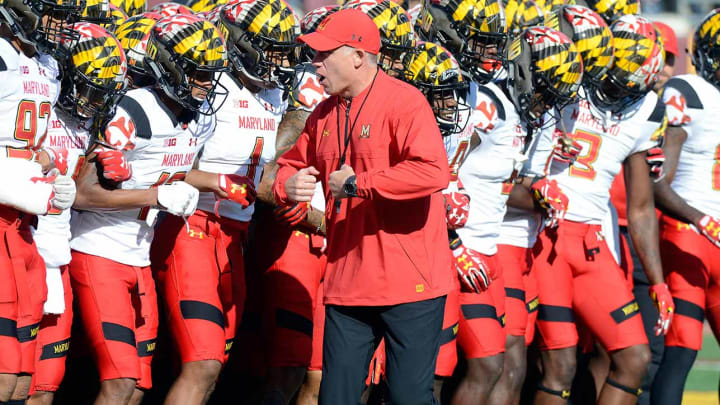Maryland's Decision to Keep DJ Durkin Offends Both Football and Non-Football Moral Codes

(Editor's note: One day after the school reinstated DJ Durkin, Maryland President Wallace D. Loh terminated the head coach.)
Too often, college football forces us to distinguish between two different sets of values. There are real-life, moral convictions, and then there is an altogether different scale of football justice. We see the distinction every season, when a favored player runs afoul of the law or a winning coach looks the other way when a problem arises in his program, then no one is punished adequately, even if everyone involved comes away with a sour taste in their mouths.
It’s rare when a decision goes against both value systems. On Tuesday, Maryland achieved that ignominious distinction.
Five months and one day after Jordan McNair collapsed at a Maryland football practice, D.J. Durkin, the head coach who oversaw the system whose failure led to the offensive lineman’s death, was reinstated to his job. That decision was made over the reported protests of university president Wallace Loh, who didn’t mention Durkin’s name at a Tuesday press conference and was told he’d be fired if he didn’t follow the regents’ recommendations, according to The Washington Post. (Athletics director Damon Evans also kept his job.) It was one last sweep of dysfunction at a program that swore up and down during Tuesday’s press conference that its investigations and task forces would lead to more commissions to establish best practices for monitoring the football program’s culture, nearly an hour of bureaucratic mumbo-jumbo that can be distilled to this: Firing Rick Court, the trainer who ran the workout after which McNair collapsed, heaping some blame on former athletics director Kevin Anderson and implementing a boatload of administrative initiatives was enough. It was the rare decision that missed the mark in both its football and non-football justifications.
Let’s remove the football implications for a minute and look at this on a basic human level. There are the medical details, which the first report explicated: that the trainers on hand elected not to place McNair in a cold tub, did not take his temperature and waited too long to call 911, all failures to meet even a low threshold of care. In the report of findings in a board commissioned investigation into the culture of the program, even more jarring details were revealed. There were accusations of organizational dysfunction within the department, as well as concrete details of Court’s and other coaches’ conduct. The trainer allegedly used homophobic slurs and threw everything from food to weights to vomit at players, while other unnamed coaches forced them to watch graphic videos of “serial killers, drills entering eyeballs, and bloody scenes with animals eating animals.” Durkin was supposed to be the man in charge, and if he stood by while these antics became ingrained, he shouldn’t be in charge of any school’s football program.
But you know by now that details like those can take a backseat to broader themes in cases like these. When football programs are forced to make decisions in a moral gray area, winning is often the bottom line—which is why Maryland’s decision to retain Durkin makes no sense whatsoever. This is a coach who went 10–15 and 5–13 in Big Ten play in his first two years with the Terps. Per the 192-page culture report, players described a program rooted in fear, and although that wasn’t a unanimous sentiment, it was prevalent enough among players interviewed so as to seem pervasive. The report aired Maryland’s dirty laundry—to the world, and to potential recruits. So now, not only is Maryland under Durkin a mediocre football team; it’s also one that’s going to have a beast of a job recruiting players from this point forward. The decision to retain Durkin gives players no incentive to speak up and suggests few, if any, repercussions for the grievances they have already aired.
There are plenty of mediocre-to-bad Power 5 programs out there where players can eat lunch without ruminating over the gory misdeeds of serial killers. They’re today’s only winners.
In his opening remarks at Tuesday’s news conference, Jim Brady, the chair of the school’s board of regents, discussed the concept of responsibility at length: the responsibility that Durkin, Evans and Loh accept for their roles in the situation and the responsibility to McNair that the school will “live up to,” Brady said. No matter, it seems, that McNair’s father said on Good Morning America in August that he hopes Durkin will never coach again.
Instead, Brady stood at the podium and said this of Durkin: “We believe he is a good man and a good coach who is devoted to the well-being of the student athletes under his charge.”
It wasn’t the time or the place for that message. Brady went on to emphasize the 38-year-old Durkin’s relative inexperience and suggest a bright future for him and athletic director Damon Evans, saying there would be no third chances. Maryland is leaning hard on dysfunction and confusion as the culprits in a broken system through which Durkin received little to no orientation for a massive job. But here’s the catch: It can both be true that Durkin didn’t receive the support due a first-time head coach and that he should be terminated. It shouldn’t take hand-holding to for a coach, no matter how overwhelmed he may be by his new role, to understand that his players shouldn’t be verbally abused and physically shamed.
At some point, even if Maryland’s administration failed Durkin, there’s no way to reestablish him as the head coach and move forward, especially when both of the values systems college programs selectively operate under are being violated. It’s a shame Maryland’s board of regents seem to be the only people not to realize this.

Staff writer Joan Niesen returned to SI in 2014 after first coming to SI as an intern while in graduate school. She covers college football and the NFL.